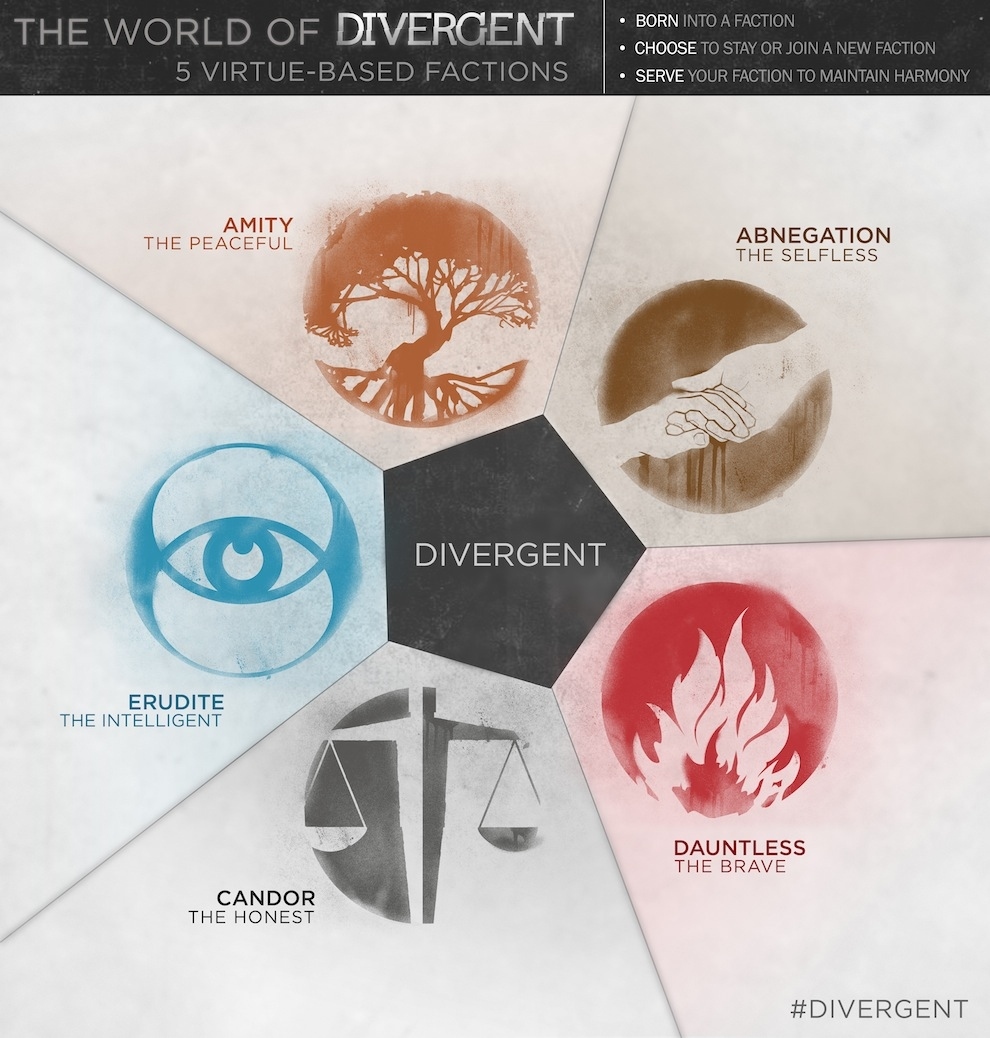Divergent factions have become a significant topic in both literature and reality, representing the various social divisions and ideologies that exist within any community. They encapsulate the struggle between conformity and individuality, showcasing how people can be categorized into distinct groups based on their beliefs, values, and behaviors. As we navigate through a world filled with diverse perspectives, understanding these factions can offer insight into not just fictional narratives but also the dynamics of our social fabric.
In many popular narratives, especially in dystopian genres, divergent factions are often depicted as groups that arise from a central conflict. These factions usually stand in stark contrast to one another, highlighting the tensions that can exist within a society. For instance, the well-known "Divergent" series by Veronica Roth illustrates how the characters are divided into factions based on their personality traits, which ultimately shapes their identities and destinies. Such portrayals encourage us to reflect on our own societal divisions and the implications they have on our lives.
Moreover, the concept of divergent factions extends beyond fiction, as real-world societies often experience similar divisions based on political, cultural, and social lines. As individuals align themselves with specific groups, the potential for conflict and misunderstanding increases, prompting discussions about the importance of dialogue and empathy in bridging these divides. By delving deeper into the nature of these factions, we can gain a better understanding of their roles and impacts in our daily lives.
What are Divergent Factions?
Divergent factions can be defined as distinct groups within a larger society that emerge from differing beliefs, values, or interests. These factions can form based on various factors, such as ideology, culture, or social status. They often represent conflicting views that can lead to tension and rivalry, but they can also foster creativity, innovation, and diversity.
How do Divergent Factions Influence Society?
The influence of divergent factions on society can be profound. These groups can shape public opinion, drive social change, and even impact political landscapes. For instance, movements advocating for civil rights, environmental protection, or social justice can be seen as factions that seek to challenge the status quo and promote their visions for a better world. However, they can also contribute to polarization, leading to an "us versus them" mentality.
What are the Characteristics of Divergent Factions?
- Shared Identity: Members of a faction often share a common identity or belief system that unites them.
- Distinct Goals: Each faction typically has specific objectives they aim to achieve, which can vary widely from one group to another.
- Conflict Potential: Divergent factions often arise from conflicts of interest, leading to potential confrontations with other groups.
- Social Dynamics: The interactions between factions can significantly influence the social climate, including cooperation or competition.
Can Divergent Factions Coexist?
The question of whether divergent factions can coexist is complex. While it is possible for groups to maintain their identities and beliefs while respecting others, friction may still arise. Dialogue and understanding are essential in facilitating coexistence, as they allow factions to communicate their perspectives and find common ground. Promoting inclusivity and empathy can also help mitigate conflicts and foster collaboration among different factions.
What Role Do Leaders Play in Divergent Factions?
Leaders within divergent factions play a crucial role in shaping the direction and effectiveness of their groups. They guide their factions' objectives, strategies, and interactions with other factions. Effective leaders can inspire unity and motivate members to work towards common goals, while poor leadership can lead to division and discord. Understanding the dynamics of leadership within these factions can provide valuable insights into how they operate and influence society.
How Can We Address the Challenges Posed by Divergent Factions?
Addressing the challenges posed by divergent factions requires a multifaceted approach. Strategies include:
- Encouraging Open Dialogue: Creating spaces for constructive conversations between different factions can bridge gaps and foster understanding.
- Promoting Education: Educating individuals about different perspectives can reduce misconceptions and encourage empathy.
- Fostering Collaboration: Initiatives that bring together diverse factions to work on shared goals can strengthen community bonds.
- Encouraging Critical Thinking: Teaching individuals to critically assess information can combat misinformation and help navigate complex social dynamics.
Conclusion: The Future of Divergent Factions
As we look towards the future, the existence of divergent factions will likely continue to shape our societies. Whether in fiction or reality, understanding these factions can empower us to navigate the complexities of human interactions. By fostering dialogue, promoting empathy, and encouraging collaboration, we can work towards a society where divergent factions coexist harmoniously, enriching our collective experience.
You Might Also Like
Cancer Zodiac Qualities: Unveiling The Depths Of Emotional IntelligenceP Diddy: Exploring His Weight And Height
The Waterboy: A Journey From The Sidelines To The Spotlight
Unveiling The Legacy: Quincy Jones And His Children
Unveiling Tom Cruise: The Height Of A Hollywood Legend
Article Recommendations
- Bobbye Brooks Oliver
- Patricia Heaton
- Mary Austin
- Did Eazy Es Wife Die
- Karen Carney Is She Married
- Noel Fielding Relationships
- Matt Czuchry Relationships
- Michael Galeotti
- Mls Playoff Format
- Simon Cowell News


